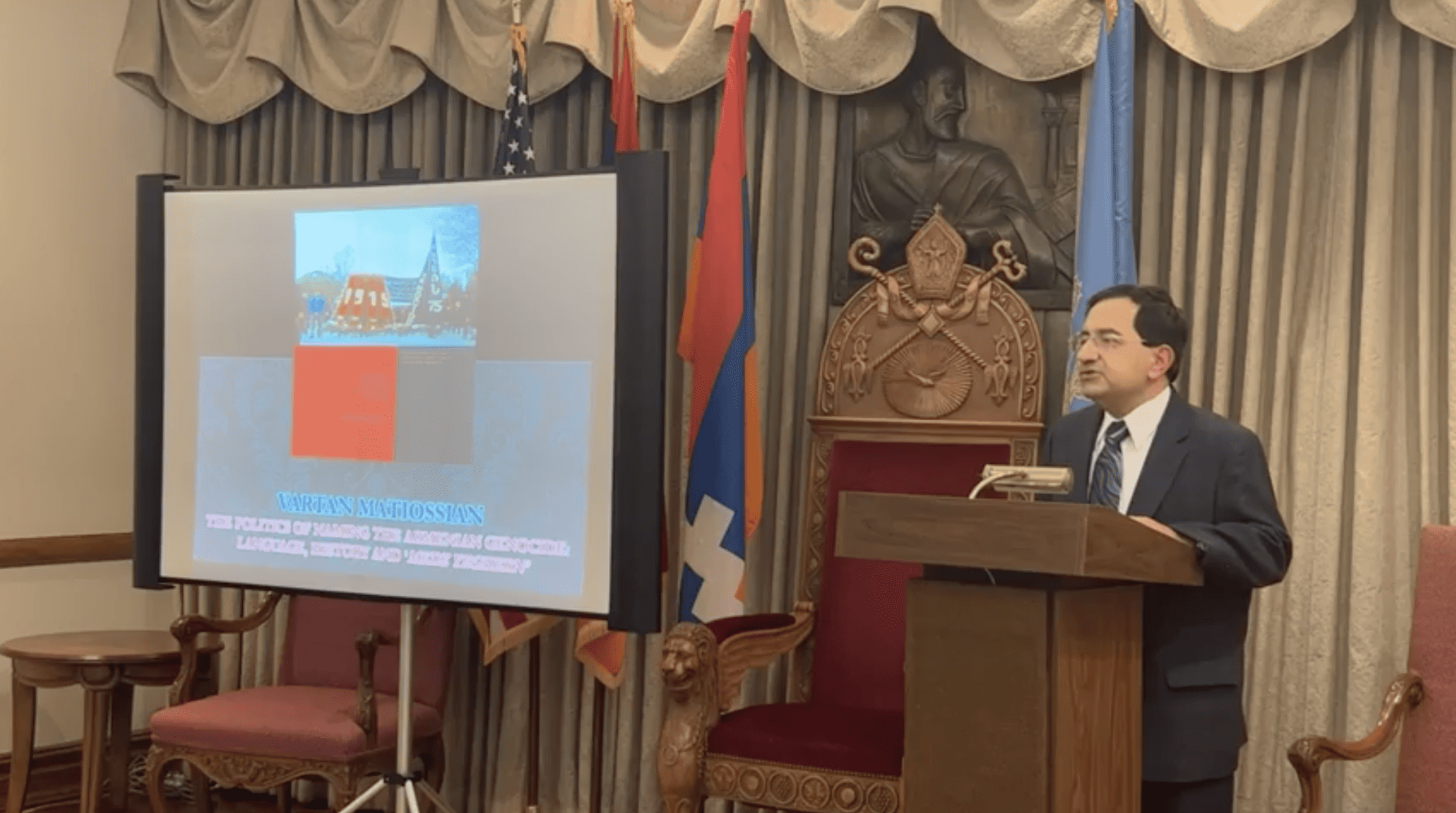DR. VARTAN MATIOSSIAN’S BOOK LAUNCHED AT THE PRELACY


From left to right: Prof. Siobhan Nash-Marshall, Archbishop Anoushavan, Dr. Vartan Matiossian, Anahid Ugurlayan, Esq., and Rev. Fr. Mesrob Lakissian.
The Prelacy hosted the book launch of “The Politics of Naming the Armenian Genocide: Language, History and ‘Medz Yeghern,’” by historian and literary scholar Vartan Matiossian, on Wednesday, Dec. 8. It was the first public event at the Eastern Prelacy headquarters since the beginning of the pandemic in March 2020.
The book, published by I.B. Tauris, an imprint of Bloomsbury Publishing, is the inaugural volume in the Armenians in the Modern and Early Modern World series. The event was livestreamed and recorded on Facebook. You may watch it here.
Dr. Matiossian, who is also the Executive Director of the Prelacy since 2019, made an extensive and illustrated presentation of the book, which explores the genealogy of the concept of Medz Yeghern (“Great Crime”), the Armenian term widely used for the genocide of the Armenians in the Ottoman Empire. The subject has been both omitted and misinterpreted in historiography.
In a lively presentation moderated by Anahid Ugurlayan, Dr. Matiossian walked the audience through the etymology of the word and its political and historical implications, drawing from a vast array of instances of its use and misuse by politicians, journalists and others.
He recalled the memorable visit by Pope John Paul II to Armenia in 2001 on occasion of the 1700 anniversary of Christianity, when he prayed at the Tsitsernakaberd Genocide Memorial and spoke of “Medz Yeghern,” unleashing a brouhaha as to why he had used that term, with some speculating that he wanted to skip the issue of the genocide and media coverage contributing to this controversy. Yet to stress how unequivocal the interpretation of the word should be, Dr. Matiossian pointed out that in Nov. 2000, Catholicos of All Armenians Karekin II had visited Pope John Paul II in the Holy See, issuing a joint statement in which they said, “the Armenian Genocide, which began the century, was the prologue to the horrors that would follow.” Hence, Medz Yeghern and Genocide are synonymous.
As an example of equivocal use, Dr. Matiossian also mentioned the late 2008 apology issued by a group of Turkish intellectuals over the Genocide, calling it “Great Catastrophe” in the English version of the statement as the translation of “Medz Yeghern,” which was broadly in line with the discourse of the Erdogan regime at the time. Dr. Matiossian also referred to the condolences offered by the Turkish dictator in 2014 on the commemoration of April 24, which again was misconstrued as more than it actually was –a formulaic expression of sympathy, like any pronounced during a funeral, with no implication of acknowledgement of the Genocide.
In the U.S., President Ronald Reagan explicitly referred to the Armenian Genocide in 1981, which earned him the appreciation of the Armenian community, regardless of the fact, Dr. Matiossian said, that the Reagan administration afterwards walked back this symbolic statement. More famously, in more recent times President Barack Obama consistently used Medz Yeghern to speak about the Genocide with equivocal intention.
Dr. Matiossian also brought up a curious example that came to confirm that Yeghern in Armenian is a synonym for Genocide –Robert Sheckley’s, an American science fiction writer whose short story “Shall We Have a Little Talk?” was translated into Armenian and published in Yerevan in 1984. The story, which in 1965 won the Nebula prize, the most prestigious one in the genre, is about interplanetary exploration and there are three instances of the word “genocide” in its generic use, without referring to any particular historical event. In the Armenian translation, the word has invariably been translated as “Yeghern.”
A Q&A session followed the presentation, with questions including one about a prayer written in 2015 on the centennial of the Genocide in which “Tseghasbanutyun” (a more modern, literal translation of “genocide” into Armenian) is used, which sounds legal, the person asking the question said, as opposed to Medz Yeghern, with its rich theological interpretations. In his response, Dr. Matiossian conjectured that the word was perhaps used not to help denialists’ arguments that Medz Yeghern doesn’t mean Genocide. In a sense, Dr. Matiossian said, this amounted to allowing others to impose the meaning that they intend for the word as opposed to the true sense of Medz Yeghern.
At the end of the Q&A part, author Siobhan Nash-Marshall, professor of Christian Philosophy at Manhattanville College, offered reflections as well. She welcomed the book for its contribution to understanding “what we are talking about” and as “the truest way to find the abuse and the denial of history, because there is no question that the Medz Yeghern took place.”
In his closing remarks, Archbishop Anoushavan said that regardless of whether we use Medz Yeghern or Tseghasbanutyun to describe the Genocide, we are talking about the intentional crime to exterminate our entire nation and we must carry on with our pursuit of justice for the sake of righteousness and truth, not only for Armenians but for everybody. The Prelate thanked Dr. Matiossian “for being true to your history once again and offer this volume to the public.”
A reception followed, during which the author signed copies of the book.
You can also order the book from the Armenian Prelacy website (armenianprelacy.org/shop) by clicking here, writing to the bookstore (books@armenianprelacy.org) or calling 212-689-7810.
